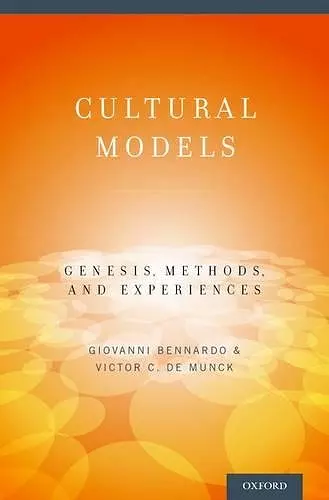Cultural Models
Genesis, Methods, and Experiences
Victor de Munck author Giovanni Bennardo author
Format:Paperback
Publisher:Oxford University Press Inc
Published:23rd Jan '14
Currently unavailable, and unfortunately no date known when it will be back

This book is about cultural models. Cultural models are defined as molar organizations of knowledge. Their internal structure consists of a 'core' component and 'peripheral' nodes that are filled by default values. These values are instantiated, i.e., changed to specific values or left at their default values, when the individual experiences 'events' of any type. Thus, the possibility arises for recognizing and categorizing events as representative of the same cultural model even if they slightly differ in each of their specific occurrences. Cultural models play an important role in the generation of one's behavior. They correlate well with those of others and the behaviors they help shape are usually interpreted by others as intended. A proposal is then advanced to consider cultural models as fundamental units of analysis for an approach to culture that goes beyond the dichotomy between the individual (culture only in mind) and the collective (culture only in the social realm). The genesis of the concept of cultural model is traced from Kant to contemporary scholars. The concept underwent a number of transformations (including label) while it crossed and received further and unique elaborations within disciplines like philosophy, psychology, anthropology, sociology, artificial intelligence, and cognitive science. A methodological trajectory is outlined that blends qualitative and quantitative techniques that cross-feed each other in the gargantuan effort to discover cultural models. A survey follows of the extensive research about cultural models carried out with populations of North Americans, Europeans, Latino- and Native-Americans , Asians (including South Asians and South-East Asians), Pacific Islanders, and Africans. The results of the survey generated the opportunity to propose an empirically motivated typology of cultural models rooted in the primary difference between foundational and molar types. The book closes with a suggestion of a number of avenues that the authors recognize the research on cultural models could be traversing in the near future.
"Bennardo and de Munck have produced a landmark work synthesizing an enormous range of material dealing with the concept of culture from a cognitive perspective. Through its brilliant and thoroughly up-to-date discussions of the history, methodology, and ethnographic application of cultural models theory, Cultural Models convincingly reaffirms the centrality of anthropology's culture concept for the social sciences." Bradd Shore, Goodrich C. White Professor, Director of MARIAL Center, Emory University "The authors summarize the current state of research in cultural modeling through the provision of an interdisciplinary review of the field and directives for research, a comprehensive discussion of mixed methods, assessment of empirical work in distinct world regions, and consideration of applied research and potentials. In the process they propose a coherent view of culture as a mechanism governing both human sociality and individual experience. With this volume they have effectively established ongoing progress in the cognitive study of culture and have clarified the relevance of cultural modeling for vital world problems and social issues. They offer conceptual and analytical foundations for future work that should enrich the interpretive significance of received models and enable scholars of diverse disciplines to advance intercultural understanding." Janet Dixon Keller, Professor Emerita, Anthropology, University of Illinois "The authors define cultural models research broadly to include quantitative as well as qualitative descriptions of shared mental representations. Their review of a wide range of such studies conducted throughout the world is very useful. I thought I knew about most cultural models research, but I learned about many more gems from reading this valuable compendium." Claudia Strauss, Pitzer College, Department of Anthropology
ISBN: 9780199908042
Dimensions: 231mm x 155mm x 15mm
Weight: 476g
336 pages